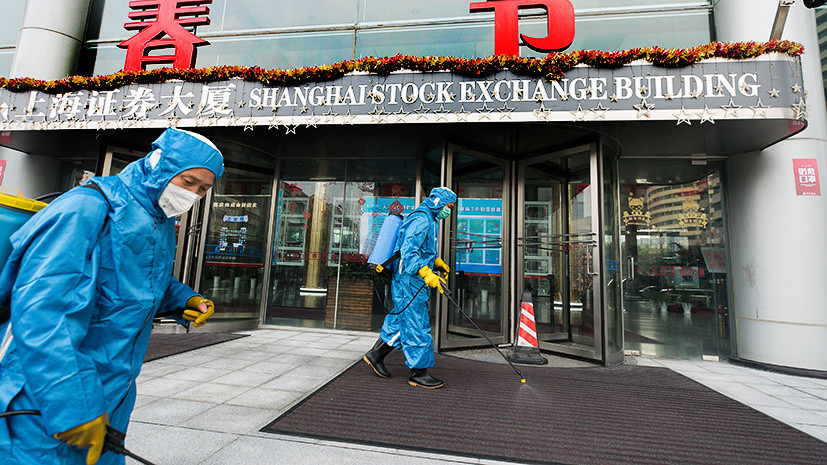On Monday, February 3, trading in the Chinese stock market closed with a record drop in quotations. The Shanghai Stock Exchange Index SSE Composite fell immediately by 7.7% to 2746 points, while the Shenzhen site indicator fell 8.4% to 1609 points. According to experts, the collapse of indicators has become the largest since 2015.
A sharp decline in the indices occurred after a long break in the work of Chinese exchanges. Since January 24, trading floors of the PRC have been closed in connection with the celebration of the New Year according to the lunar calendar. As explained by RT portfolio manager of QBF Denis Ikonnikov, during the stock exchange holidays among investors, concerns about the situation with coronavirus in China intensified. As a result, players began to massively sell securities on the first business day after the holidays.
“In many ways, the fall of the Chinese market is an emotional reaction. Investors just came out from the holidays and won back the fall that occurred throughout the past week at foreign markets. Since coronavirus is most spread in China, the reaction of Chinese investors has been more significant. If on average foreign exchanges decreased by 3-4%, then in China the collapse amounted to about 8%, ”Ikonnikov explained.
Recall that at the end of December 2019, authorities in the Chinese city of Wuhan reported an outbreak of a respiratory infection of unknown origin. January 9, the Central Television of China with reference to a group of specialists called the cause of the disease a new type of coronavirus. At that time, 15 confirmed cases of infection were detected.
To date, the number of infected has exceeded 17 thousand people, 361 infected have died, another 2296 patients are in serious condition, the State Committee for Health of China reported.
Cases of the disease are already registered in Beijing, Shanghai and other major cities of the country. At the same time, the virus began to spread outside mainland China. The cases were recorded in the USA, Japan, South Korea, Canada, France, Australia, Germany, Russia, Singapore, Thailand, Hong Kong, Vietnam, Cambodia and Nepal, as well as in Taiwan and Macau.
“The situation reminds investors of SARS that raged in Southeast Asia in 2002-2003. Then the total economic damage amounted to $ 59 billion. For example, Hong Kong lost about $ 12 billion, or 7.6% of its GDP, ”Mikhail Kogan, head of the analytical research department of the Higher School of Financial Management, said in a conversation with RT.
Investors are alarmed by the news about the suspension of enterprises, the closure of borders between cities of the republic and the evacuation by various countries of their citizens from China. It is expected that the current state of affairs in the future may result in a decline in business activity in the country, a decrease in trade volumes in Asia and financial difficulties for Chinese business. This point of view in an interview with RT was expressed by the director of the Academy of Finance and Investment Management Arseniy Dadashev.
“The largest production centers in the country are quarantined at least until February 10th. This violates the supply of goods not only within China, but also in neighboring countries. In contrast to 2003, today companies have to pay their workers in full, despite the forced vacations. Therefore, the longer the coronavirus spreads, the more difficult it will be for enterprises to cope with financial problems, ”Dadashev explained.
The aggravation of the situation with coronavirus also provoked a record collapse in world oil prices. Over the past month, the raw materials of the Brent benchmark fell by almost 17% and for the first time since January 2019, they were trading near $ 56.5 per barrel. According to analysts, the spread of the disease has led to a sharp decline in Chinese tourist flow and a drop in fuel demand.
“The current state of affairs is affecting the global economy as a whole. The PRC today accounts for about 20% of global GDP, therefore, not only the developing countries, but also Europe and the USA are falling after Asian stock exchanges, ”Dmitry Alexandrov, chief strategist at Univer Capital, said in an interview with RT.
Temporary effect
However, the impact of coronavirus on the PRC economy may be temporary. This conclusion was reached by specialists of the international rating agency Moody's.
“According to our baseline scenario, we expect that the outbreak of coronavirus will have a temporary effect on the Chinese economy, the growth rate of annual GDP in China will remain at the level of our forecast - 5.8% in 2020,” the authors of the study note.
Moreover, the PRC authorities have already begun to take measures to stimulate the economy. So, on February 2, the People’s Bank of China announced its intention to add $ 173 billion to the country's financial system. It is expected that the actions of the regulator should support Chinese banks and businesses.
“The market has already responded to the actions of the Chinese regulator, so the drop in quotes was less catastrophic than it could be. Now we do not expect further collapse of exchanges. As previously stated by the Chinese authorities, in the coming days, the spread of the virus should reach its peak. If this really turns out to be the case, then as soon as investors see that the number of patients is decreasing, and those who recover are increasing, markets will begin to grow, ”concluded Denis Ikonnikov.

